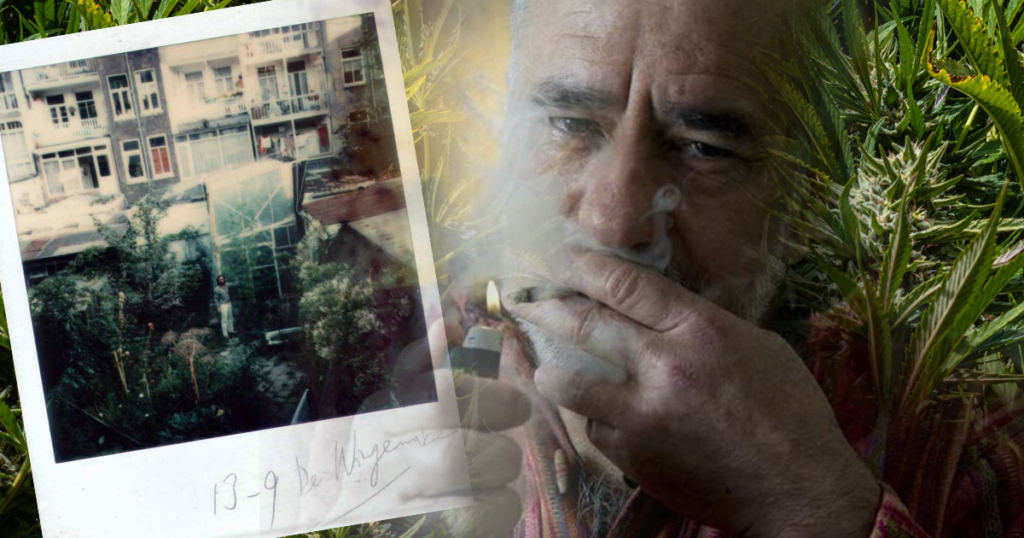Wernard Bruining is, in many ways, the founder of the Dutch cannabis scene. Wernard opened the first coffeehouse Mellow Yellow (1973-1978), he sparked the Dutch homegrown movement with the Green Team (1980-1985), founded the first seed company Lowland Seed Company (1980-1985), and he opened the first European cannabis grow shop Positronics (1985-1997), and founded the first medical cannabis foundation in Amsterdam the Mediwiet Foundation (1994-present).
In 1973 Bruining along with a number of friends/flatmates founded the first-ever Dutch coffeehouse Mellow Yellow. Taking advantage of the permissive tolerant attitudes of Dutch authorities, at the time, Mellow Yellow was able to operate without issue until 1978 when a fire destroyed the shop.
After the fire, Bruining took it as an opportunity to travel to the United States where he was introduced to American cannabis growers and the culture of homegrown sensimilla cultivation that had emerged in the US in the 1970s. One of the growers Bruining met during his visit to the states was a farmer from Oregon named ‘Old Ed’ Holloway.
After experiencing the quality of American homegrown, Bruining was determined to bring the culture and techniques of American growers back to Holland. Bruining returned to Holland and began importing American sensimilla to Holland. Before long, however, his friend Old Ed joined him in Holland. Together they had the knowledge, genetics, and vision that helped to found the domestic Dutch homegrown cannabis movement; as well as lay the groundwork for what would become the international seed industry that emerged in Holland in the 1980s.
Wernard Bruining and the Emergence of the Dutch Cannabis Scene
In 1980 Bruining along with ‘Old Ed’ founded the first Dutch seed company the Lowland Seed Company. At this same time, Wernard and ‘Old Ed’ also established the Green Team. The Green Team’s mission was to spread the educational and material support needed to help people get started growing their own homegrown cannabis. Through a distributed network of small grows the Green Team was quickly able to produce hundreds of kilos of domestically grown Dutch cannabis. In 1985 Bruining and the Green Team sent airplane tickets to David Watson and Ed Rosenthal bringing them to Holland importing additional genetics and expertise from America. As discussed in our previous profile of David Watson the introduction of the genetics that he brought to Amsterdam in 1985 fundamentally changed Dutch cannabis culture and helped to give rise to the international seed trade.
In addition to founding the first Dutch coffeeshop, and the first Dutch seed company, Wernard Bruining also founded the first European grow shop in 1985 when he opened Positronics.
Positronics was the first of its kind cannabis grow shop that sold indoor/outdoor horticulture supplies, alongside cannabis seeds and clones, with informational demonstrations and educational materials specifically for cannabis growers. Positronics continued producing and distributing seeds varieties that had previously been sold under Lowland Seeds such as Hollands Hope as well as varieties that Wernard had received from David Watson such as the Original Haze, Haze#19 x Skunk.
Wernard created the Sinsemilla Fanclub distributing tens of thousands of seeds of clones to members. Tom Hill sourced Original Haze seeds from Positronics. Tom went on to preserve and later sold seeds from this line under the name Tom Hill’s Haze. During its existence between 1985-1997 Positronics was an important domestic and international hub for the exchange and diffusion of cannabis knowledge, culture, and genetics.
By the mid-1990s Wernard’s focus shifted toward the medicinal aspects of cannabis and he started Stichting Mediwiet, the first organization dedicated strictly to advancing medicinal cannabis in Holland. Wernard has continued this work spreading and advancing medicinal cannabis in Holland to this day.
Wernard Bruining had a dream of turning Amsterdam into the hub for a thriving international cannabis culture “making Holland the Jamaica of Europe.” Throughout the 1970s ‘80s and ‘90s, he helped to make this dream a reality. For a time Holland was the epicenter of the international cannabis culture seen by many as a bastion of freedom and refuge during some of the darkest days of prohibition. Wernard in his many endeavors encouraged and cultivated the homegrown movement and what would later become the overgrow ethos that helped to spread cannabis genetics, cultivation techniques, and culture around the globe. In the 1980s Wernard Bruining helped jumpstart this global movement at the exact same time governments around the world dedicated themselves to eradicate cannabis plants and cultures.

















